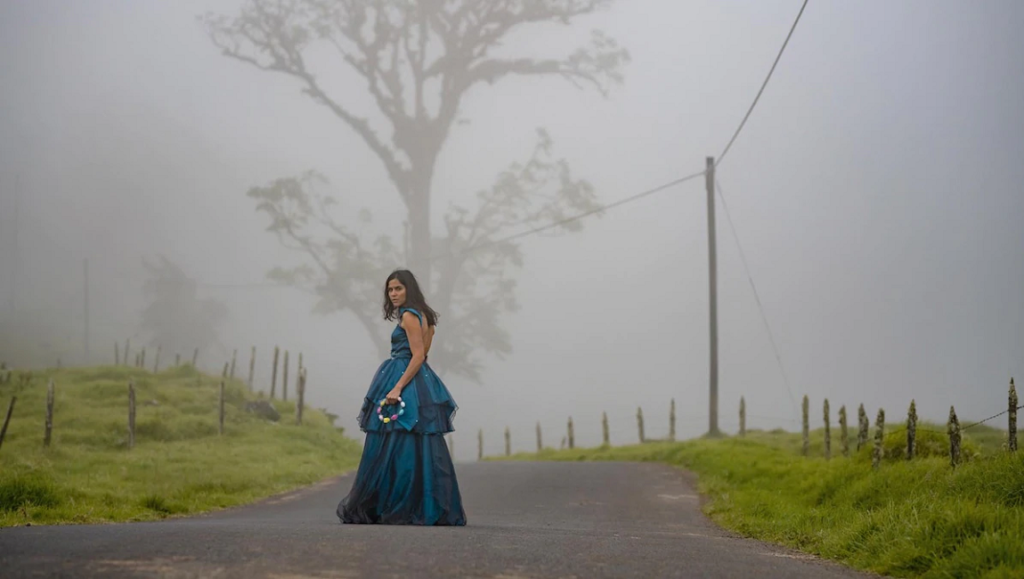Clara Sola is a bold, confrontational work, perhaps a bit too blunt in its symbolism, but carried through by Chinchilla Araya’s raw, enigmatic performance.
The debut feature of Costa Rican-Swedish director Nathalie Álvarez Mesén neatly lays its cards out in the opening shot. The titular Clara, a woman of middle age with dark hair and a piercing gaze, stands facing an unbridled white stallion, urging it to approach her. A wide shot reveals that it is her, and not the animal, who is fenced in, seemingly unable to cross past an invisible barrier marked off by some posts — she stretches her arm forward but cannot get close enough to touch it while the horse blithely idles away, free to come and go at will. The symbolism imbued in this moment expresses the focus of Clara Sola, a film about a woman’s struggle to liberate herself from the oft invisible bonds of patriarchal tradition. Álvarez Mesén, whose background includes a B.F.A. in Mime, has made an inspired casting selection in professional dancer Wendy Chinchilla Araya to play her lead. The film shines brightest in following these performance art instincts, capturing the instinctual physicality and gutting ferocity of Chinchilla Araya’s performance, which buoys the work against the downpour of symbolism threatening to capsize it.
Set in a small Costa Rican village, Clara Sola traces the lives of a three-person family unit, Clara, her domineering mother Fresia, and her niece Maria. While the dynamic between the three women at first appears typical, we are gradually introduced to the oddities of Clara’s stunted social development as she is infantilized by her mother who further pushes her into the role of a healer in the village, considered blessed by and in direct contact with the Virgin Mary. Further complicating the situation, we learn that Clara suffers from painful scoliosis — necessitating a surgery that Fresia refuses to allow — requiring her to wear a corset, which doubles as a metaphor for the rigid traditions which straitjacket her burgeoning sexuality. This immediate tension is externalized in Maria’s boyfriend Santiago, whose presence begins to shake up the stiff structure of Clara’s life. Meanwhile, parallels are drawn between her and Maria, whose quinceañera forms the focal point of the film’s climax, at once stressing the separate worlds between the aunt and her niece as well as highlighting how subtle variants of this repressive extreme permeate into acceptable traditions and norms.
Visually, we are treated to an array of intimate close-ups, with DP Sophie Winqvist Loggins (who filmed last year’s Cannes selection Pleasure) pulling striking beauty from the simplest shots. One of the most memorable is the simple framing of two pairs of hands belonging to Clara and Maria, rising up into the frame one-by-one, until Maria’s hands withdraw and Clara’s stay aloft, alone. In a later scene, Clara and Santiago sit inside his truck tracing raindrops rolling down the windshield in a makeshift race, the camera lingering on their faces awash with the playfulness of the moment. At other times, the poetic symbolism becomes too heavy-handed, the appearance and disappearance of the unruly horse Yuca, whose fate Clara sees as entwined with her own, is later mirrored by a green beetle she captures to keep with her, or elsewhere the murky fish tank centered in the room, more animals trapped within bounds they cannot control. Even the plants serve as metaphors, like the touch-me-nots, which close up quickly at that touch and, like Clara, “take ages to open.”
But however blunt much of the symbolism is, the film’s strength comes from the raw and enigmatic Chinchilla Araya, who captures Clara’s duality — at times meek and desperate for a semblance of human connection, and at others displaying an unfettered command of her powers. Her performance is paired alongside probing questions of religious dogma and patriarchal gender roles, and the combination calls to mind Satyajit Ray’s delicate yet forceful handling of similar subject matter in Devi, wherein the wonderful Sharmila Tagore played a similar role as a woman caught inside of an imposed sainthood. Álvarez Mesén, whose previous shorts touched on uncomfortable taboos within family dynamics, but never quite as directly as here, has elevated her craft to something bolder and more confrontational. She has a new project already in the works titled The Wolf Will Tear Your Immaculate Hands, and despite any minor Clara Sola reservations, I, for one, am paying attention.


Comments are closed.